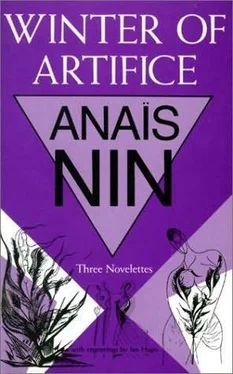Anaïs Nin - The Winter of Artifice
Здесь есть возможность читать онлайн «Anaïs Nin - The Winter of Artifice» весь текст электронной книги совершенно бесплатно (целиком полную версию без сокращений). В некоторых случаях можно слушать аудио, скачать через торрент в формате fb2 и присутствует краткое содержание. Год выпуска: 2007, Издательство: Sky Blue Press, Жанр: Классическая проза, на английском языке. Описание произведения, (предисловие) а так же отзывы посетителей доступны на портале библиотеки ЛибКат.
- Название:The Winter of Artifice
- Автор:
- Издательство:Sky Blue Press
- Жанр:
- Год:2007
- ISBN:нет данных
- Рейтинг книги:4 / 5. Голосов: 1
-
Избранное:Добавить в избранное
- Отзывы:
-
Ваша оценка:
- 80
- 1
- 2
- 3
- 4
- 5
The Winter of Artifice: краткое содержание, описание и аннотация
Предлагаем к чтению аннотацию, описание, краткое содержание или предисловие (зависит от того, что написал сам автор книги «The Winter of Artifice»). Если вы не нашли необходимую информацию о книге — напишите в комментариях, мы постараемся отыскать её.
“A handful of perfectly fold fables, and prose which is so daringly elaborate, so accurately timed… using words as magnificently colorful, evocative and imagist as any plastic combination on canvas but as mysteriously idiosyncratic as any abstract.”
—
The Winter of Artifice — читать онлайн бесплатно полную книгу (весь текст) целиком
Ниже представлен текст книги, разбитый по страницам. Система сохранения места последней прочитанной страницы, позволяет с удобством читать онлайн бесплатно книгу «The Winter of Artifice», без необходимости каждый раз заново искать на чём Вы остановились. Поставьте закладку, и сможете в любой момент перейти на страницу, на которой закончили чтение.
Интервал:
Закладка:
While the Voice tracked down each minor incident of her life to expose the relation between them, the fatality and importance of the link between them, the heavy destined power of each one, she felt like an actress who had never known how moving she had been, she felt like a creator who had prepared in some dim laboratory of her soul a life like a legend, and only to-day she was reading the legend itself out of an enormous book.
This was part of the legend, the little man brusquely deciphering each incident, marvelling always at the miracle which had never seemed a miracle before, her walkin heng and buying a bracelet, as miraculous to the Voice as liquid turning to gold in an alchemist’s bottle. She had not only covered the earth with a multitude of little spontaneous acts but these acts accomplished so slidingly, so swiftly, could all be illumined with spiritual significance, divine intentions, loved for their human quality or feared for their monstrous uniqueness. He worshipped them for the very act of their flowering.
He revolted now and then against her uncapturableness but she subtilized the situation. She did not want reality. She feared reality. She was really a flame. One could not possess a flame. She annulled the boundaries, confused the issues, effaced the black and whiteness. All the definite decisions, outlines, realities, she melted into a dream-like substance. She enchanted him with a sea of talk, hypnotized him with inventions and creations, so that he would cease his clutching, become cosmic again. She talked him out of the reality of her presence.
What he did not know was that at the same time she was losing her faith in all interpretations, since she saw how they could be manipulated to conceal the truth. She began to feel the illusory quality of all man’s interpretations, and to believe only in her feelings. Every day she found in mythology a new pretext for eluding his desire for her. First she needed time. She must become entirely herself and without need of him. She was waiting for the moment when she would have no more need of him as a doctor. She was waiting for the man and the doctor to become entirely separate, and never to be again confused in her. This he accepted.
But when he was not being the doctor, she discovered he was not a man but a child. He wept like a child, he raged, he was filled with fears, he was possessive, he invaded her room without delicacy, he complained and lamented about himself, his own life. He was desperately hungry and awkward in life, clutching rather than enjoying. The human being hidden in the healer was stunted, youthful, hysterical. As soon as he ceased to be a teacher and a guide, he lost all his strength and deftness. He was disoriented, chaotic, blind. As soon as he stepped out of his role he collapsed. Lilith found herself confronting a child, a child lamenting, regretting, impatient, fretful, lonely. He wrote inchoate love notes with ink blots, he leaped to meet her in the street, perspiring, nervous. He was jealous of the man who washed her hair. The child that she awakened in him was like the child in all those who had come to him for care, unsatisfied, lamenting, tearful, sickly.
He wanted to go to the sea shore with her. Lilith and the Voice then, walking along the boardwalk. Crowds. Discord between sea and voices, between wind and flags, between shop windows and sand. Grating. Or was it Lilith grating at the touch of the Voice’s hands, like sticks of wood falling on her.
The crowd walking, chewing, breathing, grunting. The wind slicing open dyed hair, teasing false feathers. The salt so bitter on this skirt of the sea’s dance trodden by bold houses with mangy-faced facades.
Open-jawed shops with loud speakers selling furniture and horoscopes. The Voice slipping coin after coin in the slot machine for music. “Do you want more music? Do you want more music?&qot Coins in the slot machine for music.
Long boardwalk of monsters with walrus faces, the rictus of the ray fish, the eyes of telescope fishes, and woodpecker’s voices. Sand in everything, lips which seemed peeled of their skin. The rust, the rust in reality slowing down her rhythm to a sob.
The sea sullen, withdrawn.
Men dragging the enormous net thrown from the end of the pier for deep sea fishing. The net was empty. The fish were being carried away. On the ground lay the jellied star fish unwanted, unsaleable. The sailors jerked out their knives and threw them into the fishes, pinning them to the boardwalk. Laughter. Another knife. No blood stains, but stains of sea ebbing from the wounds. Entrails of gelatine breaking. Coiling and recoilings of gelatinous pain. The sailors laughing.
The sea inside Lilith churning with revolt. The sea in her ebbing heavily back and forth away from human touch.
He moves wooden arms around her: they fall crossed in front of her, clasping nothing. The scarecrow is agitated. Do you want to dance? Do you want waffles? What do you want?
The sea inside of her recoiling angrily against all touch. Recoiling from the sand in his voice. He is chaining words together to establish a current. Words chained together. The chaplet of meaning might produce the semblance of a symphony. He was chaining together with meaning what need never have been separated and should have been continuous like a symphony in the blood.
“Everything was unreal before you came, Lilith. No woman loved me for myself. I created and invented them. I did not have to create you.”
All that he said vanished faster than music and was without echo in her.
Only the flow of words, dying quickly because underneath her is this sea, her nature which will not flow into him; underneath was her lie and his blindness to the lie.
The Voice talked to create the semblance of a symphony, seeking to conjure up life by interpretation. This rhythm was illusion; it was only the rhythm of thought. He could not touch her. The sea was angry. People were walking without rhythm, caressing without rhythm. People were talking and weeping and dancing without rhythm. The miracle did not take place. It did not happen in the body. The miracle did not happen, the simple miracle of love.
According to the pattern written with indelible philosophical ink, this is the moment when life should glow. But the sea in her heaves with discontent and has no answer, no yielding either.
She no longer heard the music from the boardwalk, the angry snoring of the sea. Before her stood a tall man in armour. She was kneeling before him. She was caressing the polished armour, seeking the sex with her mouth. The man in the armour did not move. She struck at it with a hammer. As the pieces of armour fell off, the body fell apart. All the pieces lay on the floor—the heart, the hands, the head, the feet, but no sex. The woman was still seeking it with her mouth. Another man was walking towards her. There were noeyes in his face. He turned around. The eyes were placed in the back of his head. He saw her. He walked away from her with arms outstretched. She followed him. He saw her but he walked away faster and faster. Finally he sat down and sobbed. Enormous tears came out of his eyes, but they were like soap bubbles, they rose in the air. He sat there weeping from the back of his head.
A kitten was biting her toes. She sat down and covered her feet with her dress. A man took the kitten and opened its paws with a knife, as if they were oysters. A man who was pursued came into her room through an attic window over her head and threatened to choke her. Hearing a noise he tried to hide. The door opened and four men were there to catch him. But Lilith loved the man and felt pity for him.
She was sitting in front of the Voice, their knees were touching. He was saying that she was not ill, she did not need any more care, but she must wear this dress of which he showed her a picture. It was a flowing white dress. Lilith said: “But it’s a wedding dress!” He said: “You were never really married.” She saw that they had been living together in a completely padded apartment, sound-proof. Satin-lined. But she was not a woman. She was a lamp-light, five-pointed, standing in the fog. She felt the black-rusted iron casing around her, and the glass chapel head. Inside the glass chapel there was a tongue of light, and on her shoulder was a sparrow. She was awake and twinkling without eyelids. She felt yellow, wet, and multiplied hundreds of times along the street; she felt dust in her eyes which she could not shake off because of the iron frame.
Читать дальшеИнтервал:
Закладка:
Похожие книги на «The Winter of Artifice»
Представляем Вашему вниманию похожие книги на «The Winter of Artifice» списком для выбора. Мы отобрали схожую по названию и смыслу литературу в надежде предоставить читателям больше вариантов отыскать новые, интересные, ещё непрочитанные произведения.
Обсуждение, отзывы о книге «The Winter of Artifice» и просто собственные мнения читателей. Оставьте ваши комментарии, напишите, что Вы думаете о произведении, его смысле или главных героях. Укажите что конкретно понравилось, а что нет, и почему Вы так считаете.











